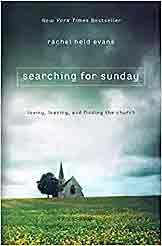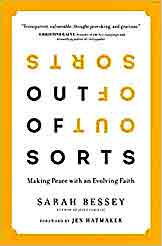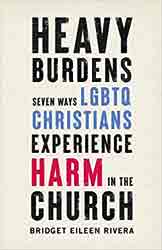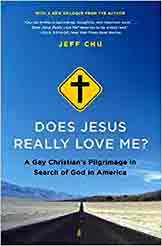Others Have Gone Before Us Beyond the Sanctuary Doors. While I Might Not Agree With Their Every Conclusion, I Believe These Authors Are Worth Reading. Welcome to the Outside World of Exvangelical Living.
Post-Evangelicals, Exvangelicals, Deconstructionists, and Transcending Evangelical Thinking.
If God Is Love Don’t Be A Jerk by John Pavlovitz
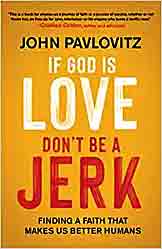
*Rachel’s Note: I actually went back and forth on whether or not to add this book to the website. John Pavlovitz has street cred to spare, but because his faith journey is quite different from mine, I had reservations. However, this book has so many gems and so much terrific advice on how to live out the commands Jesus gave us to love others, I simply must offer it here. I’ve found no other resource quite like it. A caveat: as with every book I recommend, I encourage readers to think through these difficult issues themselves. I wrestled with this book for weeks- I encourage you to do the same!
Thou Shalt Not Be Horrible.
The Official Review: Imagine for a moment what the world might look like if we as people of faith, morality, and conscience actually aspired to this mantra.
What if we were fully burdened to create a world that was more loving and equitable than when we arrived?
What if we invited one another to share in wide-open, fearless, spiritual communities truly marked by compassion and interdependence?
What if we daily challenged ourselves to live a faith that simply made us better humans?
John Pavlovitz explores how we can embody this kinder kind of spirituality where we humbly examine our belief system to understand how it might compel us to act in less-than-loving ways toward others.
This simple phrase, “Thou Shalt Not Be Horrible,” could help us practice what we preach by creating a world where:
- Spiritual community provides a sense of belonging where all people are received as we are;
- The most important question we ask of a religious belief is not Is it true? but rather, is it helpful?
- It is morally impossible to pledge complete allegiance to both Jesus and America simultaneously;
- The way we treat others is the most tangible and meaningful expression of our belief system.
In If God Is Love, Don’t Be a Jerk,
John Pavlovitz examines the bedrock ideas of our religion: the existence of hell, the utility of prayer, the way we treat LGBTQ people, the value of anger, and other doctrines to help all of us take a good, honest look at how the beliefs we hold can shape our relationships with God and our fellow humans―and to make sure that love has the last, loudest word.
How To Heal Our Divides by Brian Allain
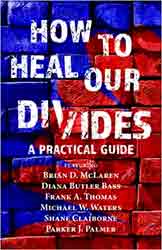
*Rachel’s Note: How to Heal Our Divides is an anthology, composed by a kaleidoscope of writers, speakers, activists, advocates, theologians, teachers, preachers, thinkers, scholars, radicals, rabble-rousers, storytellers, former legislators, ministers, peacemakers, Mormons, chaplains, lecturers, rabbis, professors, grandmas, gardeners, artists, professors, chaplains, pastors, and counselors.
Their stories illuminate our communal brokenness and where our society has fallen short of loving our brothers and sisters. Our LGBTQ sibs, our Black, Brown, and Asian sibs, our homeless sibs, our differently-abled sibs, our desperate Latin American sibs, our hungry sibs, our sibs on Death Row, and so many others. Jesus gave us explicit instructions on how we are to care for His kids, and these folks are doing it. We can do it, too.
The Official Review:
Recent times have put a spotlight on the inequities, systems of oppression, and deep divisions in our society. Much has been written that acknowledges and describes racial, political, religious, and other divides, but there is little practical information on what can be done about them. How to Heal Our Divides highlights organizations that are taking real action to address these issues and heal divides in effective and practical ways. Take a look to see how you can help make the world a better place.
Searching For Sunday
New York Times bestselling author Rachel Held Evans comes a book that is both a heartfelt ode to the past and hopeful gaze into the future of what it means to be a part of the Church.
*Rachel’s note: Searching For Sunday gripped me by the soul and squeezed out the tears I scarcely realized were there. She eloquently details the feelings of betrayal resulting from the Evangelical Church’s questionable choices, discriminatory prejudices toward women (even in the 21st century), and the heartache we suffer as a result. She searches the church, the alternatives, and grapples with the pain when there are no answers. I absolutely love this book.
The Official Review:
Like millions of her millennial peers, Rachel Held Evans didn’t want to go to church anymore. The hypocrisy, the politics, the gargantuan building budgets, the scandals–church culture seemed so far removed from Jesus. Yet, despite her cynicism and misgivings, something kept drawing her back to Church. And so she set out on a journey to understand Church and to find her place in it.
Centered around seven sacraments, Evans’ quest takes readers through a liturgical year with stories about baptism, communion, confirmation, confession, marriage, vocation, and death that are funny, heartbreaking, and sharply honest.
A memoir about making do and taking risks, about the messiness of community and the power of grace, Searching for Sunday is about overcoming cynicism to find hope and, somewhere in between, Church.
Jesus Feminist
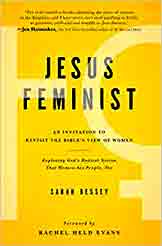
Written with poetic rhythm, a prophetic voice, and a deeply biblical foundation, this loving yet fearless book urges today’s church to move beyond man-made restrictions and fully welcome women’s diverse voices and experiences.
*Rachel’s note: In Jesus Feminist, I learned that the Bible verses used by modern Evangelicalism to “keep women in their place” are, upon further examination, often taken out of context and used incorrectly. I’ve become quite familiar with Sarah Bessey, not only through this book but through her work in Evolving Faith. She has a deep respect for the church, the Bible, and most of all Jesus- and she opened my eyes to the truth. Small wonder women are disillusioned by Evangelical Christianity.
The Official Review:
Sarah Bessey didn’t ask for Jesus to come in and mess up all her ideas about a woman’s place in the world and in the church. But patriarchy, she came to learn, was not God’s dream for humanity.
Bessey engages critically with Scripture in this gentle and provocative love letter to the Church. Written with poetic rhythm, a prophetic voice, and a deeply biblical foundation, this loving yet fearless book urges today’s church to move beyond man-made restrictions and fully welcome women’s diverse voices and experiences.
It’s at once a call to find freedom in the fullness, hope, glory, and work of Christ, and a very personal and moving story of how Jesus made a feminist out of her.
Out Of Sorts
Out of Sorts, Sarah Bessey—award-winning blogger and author of Jesus Feminist, which was hailed as “lucid, compelling, and beautifully written” (Frank Viola, author of God’s Favorite Place on Earth)—helps us grapple with core Christian issues using a mixture of beautiful storytelling and biblical teaching, a style well described as “narrative theology.”
*Rachel’s note:
Never in a million years did I ever think I would leave the Evangelical Church. The love I found there took the place of the family I never had in my youth. But then again, never in a million years did I ever dream that the Religious Right political juggernaut would lead millions of Christians astray in their quest for power and alliance with Donald Trump. I still adore Jesus. But Sarah’s account of her journey through “deconstruction” and “reconstruction” let me know I am not alone in the process. And boy, does she love Jesus! Just like me.
As she candidly shares her wrestlings with core issues—such as who Jesus is, what place the Church has in our lives, how to disagree yet remain within a community, and how to love the Bible for what it is rather than what we want it to be—she teaches us how to walk courageously through our own tough questions.
In the process of gently helping us sort things out, Bessey teaches us how to be as comfortable with uncertainty as we are with solid answers. And as we learn to hold questions in one hand and answers in the other, we discover new depths of faith that will remain secure even through the storms of life.
Heavy Burdens: Seven Ways LGBTQ Christians Experience Harm in the Church
Religious faith reduces the risk of suicide for virtually every American demographic except one: LGBTQ people. Generations of LGBTQ people have been alienated or condemned by Christian communities. It’s past time that Christians confronted the ongoing and devastating effects of this legacy.
*Rachel’s note:
Of all the books I’ve reviewed on this site, Heavy Burdens just breaks my heart.
For everyone who cares what these precious souls, created in the image of God, suffer through in the name of Christianity, this book is for you. Anyone who loves an LGBTQ person and wants to understand the persecution they’ve suffered at the hands of “the faithful,” this book is for you. For all who claim to follow Jesus, you owe it yourselves to get educated. I did.
The Official Review:
Many LGBTQ people face overwhelming challenges in navigating faith, gender, and sexuality. Christian communities that uphold the traditional sexual ethic often unwittingly make the path more difficult through unexamined attitudes and practices. Drawing on her sociological training and her leadership in the Side B/Revoice conversation, Bridget Eileen Rivera, who founded the popular website Meditations of a Traveling Nun, speaks to the pain of LGBTQ Christians and helps churches develop a better pastoral approach.
Rivera calls to mind Jesus’s woe to religious leaders: “They tie up heavy burdens, hard to bear, and lay them on the shoulders of others; but they themselves are unwilling to lift a finger to move them” (Matt. 23:4). Heavy Burdens provides an honest account of seven ways LGBTQ people experience discrimination in the church, helping Christians grapple with hard realities and empowering churches across the theological spectrum to navigate better paths forward.
Does Jesus Really Love Me?
A Gay Christian’s Pilgrimage in Search of God in America is part memoir and part investigative analysis that explores the explosive and confusing intersection of faith, politics, and sexuality in Christian America.
*Rachel’s note:
One of the most amazing things about getting older is realizing I don’t need to have all the answers. Now when I have questions, I know to look to Scripture first. THEN I look to understand that Scripture in context. Finally, I seek the wisdom of others that I trust. I became acquainted with Jeff Chu through Evolving Faith. As a lifelong reader of many thousands of books, I was so impressed with his investigative writing (he’s a journalist), his understanding of Scripture (a seminarian, preacher, teacher, author, and podcaster), and his heart. I can’t say enough about the care, the depth, the skill, the writing, and the love of God I found in this book.
The quest to find an answer is at the heart of Does Jesus Really Love Me? —a personal journey of belief, an investigation, and a portrait of a faith and a nation at odds by award-winning reporter Jeff Chu.
From Brooklyn to Nashville to California, from Westboro Baptist Church and their “God Hates Fags” protest signs, to the pioneering Episcopalian bishop Mary Glasspool—who proclaims a message of liberation and divine love, Chu captures spiritual snapshots of Christian America at a remarkable moment, when tensions between both sides in the culture wars have rarely been higher.
Funny and heartbreaking, perplexing and wise, Does Jesus Really Love Me? is an intellectual, emotional, and spiritual pilgrimage that reveals a nation in crisis.

